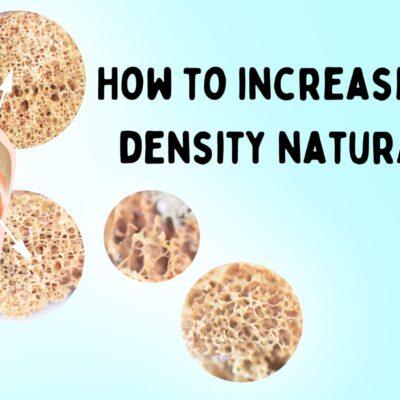How to increase bone density naturally: Bone density is necessary for a person’s overall health. If the bones lose density, they may break efficiently. Bone density transforms over time. When a person enters their late 20s, they reached their peak bone mass, which means that they will no longer acquire bone density. The bones may lose density as a person continues to age. However, there are many forms to help boost and support bone density. Keep reading this article for tips on increasing bone density naturally.
How to increase bone density naturally
Weightlifting and muscle training
Muscle training may increase bone mineral density and decrease inflammation. As per the studies, both weightlifting and strength training help encourage new bone growth and maintain the existing bone structure.
Eating more vegetables
Vegetables are low in calories and provide vitamins, minerals, and fiber. Vitamin C may help save bones from damage. Eating yellow and green vegetables is beneficial the most people. Among children, these vegetables help promote bone growth; in adults, they help in gaining bone density and strength.
Consume calcium throughout the day
Calcium is the basic nutrient for bone health. As the bones break down and grow each day, people must include calcium in their diets. The best way to soak calcium is to consume small amounts throughout the day, instead of eating one high-calcium meal per day.
Eating foods rich in vitamins K and D
Foods rich in K-2, play an essential role in bone health. Vitamin K-2 plays a critical role in bone health by decreasing calcium loss and helping minerals bind to the bones. Vitamin D helps the body absorb calcium. People with vitamin D deficiencies have a higher risk of losing bone mass.
A person can soak vitamin D through mild sun exposure. Without sufficient vitamin D, a person has a higher risk of conceiving bone disease, such as osteoporosis or osteopenia.
Also Read: How to improve immunity?
Maintaining a healthy weight
A healthy weight is essential for bone density — underweight people have a higher risk of developing the bone disease, while excess body weight puts additional stress on the bones.
People should avoid quick weight loss. As a person loses weight they can lose bone density, but the density is not restored when a person gains back the weight. This reduction in density can lead to weaker bones.
Avoiding a low-calorie diet
Super low-calorie diets can direct to health problems, including bone density loss. Before dieting, discuss calorie requirements with a healthcare provider to decide a safe target number of calories to take. Your diet should include a ratio of protein, fats, vitamins, and minerals.
Eat more protein
Protein plays a crucial role in bone health and density, and a person should assure that they have enough protein in their diet.
Eat foods rich in omega-3 fatty acids
Omega-3 fatty acids play a function in maintaining bone density. Omega-3 fatty acids are present in a combination of foods, such as salmon, nuts, and seeds. People can consume these fatty acids with the help of their diet or supplements.



